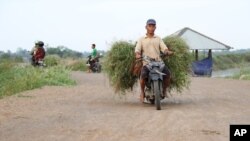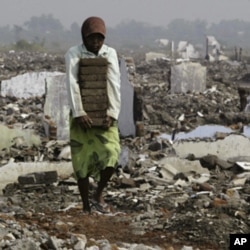A giant mud volcano that erupted five years ago (05/29/2006) near a gas drilling site in Indonesia is still spewing toxic sludge. It has destroyed entire villages in eastern Java and scientists say it will continue to erupt for years to come.
Isman feeds his chickens and cows behind his in-laws’ home in Gempolsari village. The 56-year-old was once a builder, but now makes a modest living from his livestock. Five years ago, a mud volcano erupted nearby and destroyed his home and possessions, as well as the local economy.
As the volcano continues to spew toxic sludge and gas that pollutes the air, residents of the once active community of fishermen and factory workers have fled - Gempolsari is now a sleepy town.
Isman is just one of thousands of victims in Sidoarjo district still waiting for promised compensation. He says that the gas drilling company believed to be responsible for the eruption owes him 30 percent of his $1,000. He needs the money to rebuild his house and move on with his life. "I have been compensated for my home," Isman said, "but not my land. I received a first payment of $500, and then $180 over six months."
The Sidoarjo mud volcano was at one time spewing enough sludge each day to fill 50 Olympic-size swimming pools, inundating 12 villages and seriously damaging others. M ore than 40,000 people have been displaced.
The government says the mudflow has finally slowed to 10,000 cubic meters of mud, water and gas a day, and that at that rate the enormous lake of mud contained by dikes is far more manageable.
International scientists met recently in the nearby city of Surabaya to discuss the change in the volcano’s behavior.
A geologist with Durham University in Britain, Richard Davies, said in Surabaya the volcano’s pressure is diminishing. But there a possibility the pressure could slowly build and cause an even bigger eruption. He says the mud volcano is the most unpredictable in the world. “The way it's behaved is entirely unnatural, and it is in fact completely unique. It has erupted continuously, pretty much, for five years. That is unheard of in natural mud volcano systems," he said.
The volcano originally erupted in a rice field near a gas drilling site owned by the company Lapindo Brantas. Lapindo maintains the disaster was caused by an earthquake that occurred 280 kilometers away two days earlier. But Davies and other geologists maintain the drilling caused the eruption. “What is interesting is that it kicked off a unique experiment, where a mud volcano developed over a period of five years rather than 5,000 or 10,000 years. So we have seen a mud volcano develop over a very very quick time span, and that is completely unique, and has never happened on earth in historical times," he said.
Although the company denies responsibility, it agreed to pay the victims in installments. The company recently missed its deadline to make the final payment.
Hundreds of victims recently took to the streets of Sidoarjo to demand Lapindo shell out the remaining $140-million in compensation.
The crowd also objected to the company's plan to start a new drilling project this August, just two-and-a-half kilometers from the volcano.
Lapindo is owned by the Bakrie family, whose patriarch is Aburizal Bakrie, a business tycoon and member of the coalition government. Bakrie has distanced himself from his family’s business since the disaster as he prepares to campaign for the presidency in 2014.
Aburizal Bakrie’s brother, Nirwan Bakrie, runs the family’s business empire, which owns coal, media and telecommunication companies. Nirwan Bakrie blames the 2008 financial crisis for missing the payment deadlines and denies the company owes the victims any compensation at all. “I disagree with the perception of compensation because what we have done is we have agreed with the victims to buy their land, because they lived on land, which at that time they could not live anymore. So we came together and agreed to buy their land. And the price was given by them without any negotiation. So we purchased the land," he said.
Ever since the eruption, authorities have been dredging the hot sludge into the river and out to sea - damaging the marine ecosystem and contaminating water. Some scientists estimate the mud will keep flowing for 26 years, while others say it could go on for more than 80 years.





